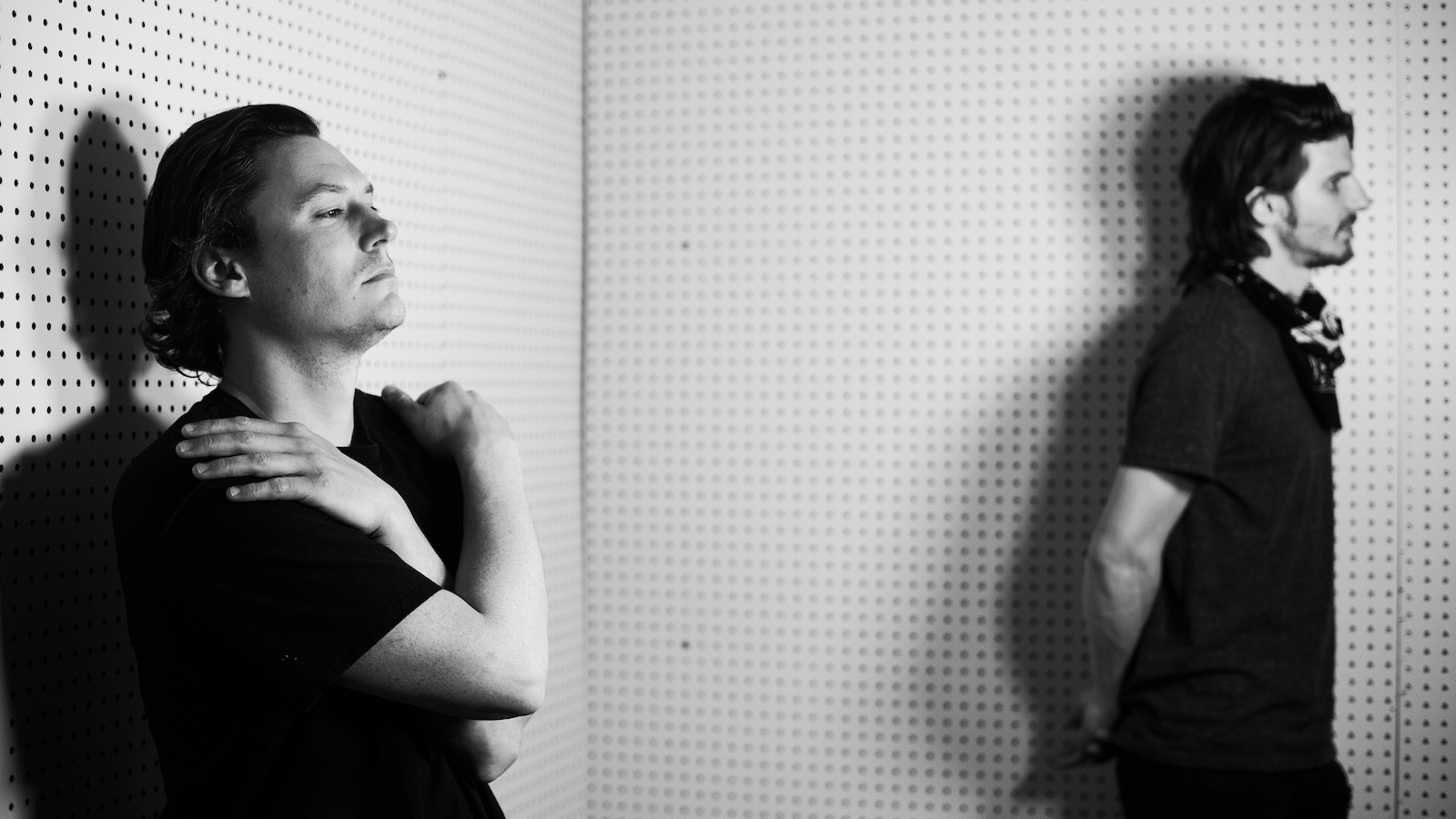The Front Bottoms: “It was fun because we got to get into a room together and just jam out”
The Front Bottoms mastered their transition from basement-staple folk-punks to arena-packing pop kings. Now, they’re throwing caution to the wind with an album of pure, unfiltered chaos

In the span of five albums, two EPs and a handful of scattered mixtapes and one-off drops, The Front Bottoms have donned many a cap. Most will agree on their folk-punk phase as their most defining: the go-to structure was a bed of raw, harshly strummed acoustics, playful horns and jangly keys over which frontman Brian Sella would wax lyrical – with clarity and polish defiantly optional – on frayed connections, anxiety and general early-adulthood turbulence. But as Sella grew up, so too did The Front Bottoms’ sound.
2015’s Back On Top saw them throw everything and the kitchen sink into one big, overblown musical smoothie of pop, rock, funk, punk, balladry and even a little tropical flare. Almost in rebellion of how motley it was, the follow-up – 2017’s ultra polished and pop‑focussed Going Grey – was notably understated. But if anything, it seemed The Front Bottoms had found a comfortable medium to exist within; a formula to which future instalments could adapt.
And then came In Sickness & In Flames. Album #5 is not only the Jersey duo’s most experimental work by an unapologetically wide margin – it is, in all the most idyllic ways one could imagine, an absolute clusterf***. It makes Back On Top feel milquetoast in comparison. Pop it on shuffle and one second, you’ll be tapping your toes to a catchy and kitschy dance-pop number – the next, you’re being roundhouse kicked in the temple by a wicked overdriven post-metal riff. Just as you’re regaining composure, you’ll hear a country scorcher pave the way for a piano ballad to fill the frame.
There was no way we couldn’t immediately hop on the phone with Sella once we’d settled down from our playthrough. The Front Bottoms have officially entered chaos mode, and we needed to know everything about it. Thankfully, we got a ring…
In a way, this record feels like a response to Going Grey: that LP was very tight, focussed and pop-centric, whereas Sickness is very loose, jammy and experimental. Was that a deliberate contrast you wanted to nail?
Nothing was really deliberate. The Front Bottoms is just kind of a reflection of the life Mat and I live – because it’s been our lives’ work for so long, it just happens the way that it happens. Because it is like an art project, essentially, we always try to go with the flow. But it is a bit like that, y’know? Whenever you finish a big art project, like an album, whatever you do next is always going to be a little bit like a reaction, or a response to what came before it. So there definitely was a bit of that going on, but it wasn’t super deliberate.
On some of these songs – especially like “Montgomery Forever” and “Leaf Pile” – the guitars are just f***ing insane… Like, you are just absolutely shredding on this record. Was it fun to unlock your inner rockstar?
Hell yeah! It was ripping, y’know? It was a fun experience because we got to get in a room together and basically just jam out. It was me, Mat and our producer friend Erik [Kase Romero], and Erik would be like, “Okay, I’ve got this guitar riff.” And then he’s just rip out this absolutely insane thing. He would normally play bass with us, but he filled in a lot of the guitar stuff on this one.
He and I would exchange riff ideas back and forth all the time – and he’s just A+ when it comes to engineering and musicianship and stuff like that, so we were very lucky to have him in the studio with us. But it was definitely a ripper. Especially a riff like “Leaf Pile” – that riff is so intense and heavy and scary, and I feel like with the acoustic guitar playing that heavy riff, it’s just kind of extra cool. I’m glad we got to experiment with that.
Get The Pick Newsletter
All the latest guitar news, interviews, lessons, reviews, deals and more, direct to your inbox!
There’s also a bit of a bluesy edge to “The Hard Way”, which is pretty new for The Front Bottoms. Have you always had a soft spot for the twanger side of the musical spectrum?
Yeah, I think so! It always gets to a certain point, when you’re playing with guitars, that you’re going to fall into certain patterns. So with a song like that, because it is just those four chords driving it along, it kind of has a rock ’n’ roll vibe – it definitely goes into that country sort of twang, and that’s something I was really excited about.
There’s a song called “Carry You Down The Street” that we have from, like, a way long time ago – and also “I Think Your Nose Is Bleeding” – those two songs from The Front Bottoms’ early days, to me, feel like country songs. I don’t think they really sound like country songs, but that attitude is definitely there.
So it’s always sort of been there, it’s just that at the time, with how we were expressing the music, it wasn’t really in the forefront. But it definitely is on “The Hard Way”, hell yeah. With that little guitar solo, we were definitely trying to tap into that country vibe a little bit. We were all just rockin’ and rollin’ together, so all of that energy just came out naturally.
What guitars did you have to rock ’n’ roll with?
On this record, I was playing a very simple Epiphone acoustic-electric – it’s one of the Masterbilt models, but, like, at the cheaper end of the line. I would always play those live because plugged into an amp, it just rips. And then y’know, I’m not really like a gear head, so I would just kind of grab whatever was around in the studio. There was a classical guitar with nylon strings that we got to put on a lot of stuff – that was really fun to play around with. I got a Fender acoustic-electric towards the end of the process as well, which was cool.
What is it about that Masterbilt Epiphone that you adore so dearly?
It’s rugged, y’know? I always try to play the guitar as rough as I can. So even though the electronics maybe don’t sound the best, or as clean as something else out there, it doesn’t matter – it just has to be loud and sturdy. I kind of like that energy in general. If I go into a guitar store, I’m buying, like, the wackiest guitar I can find. I like the wacky stuff and the cheap stuff – the stuff that’s going to make you go, “Dude, what the f***?” That’s more my flavour – all that expensive stuff doesn’t really do it for me.
It fits the overall vibe of The Front Bottoms, I think – it’s not flashy or technically insane, it’s just loose and fun.
Oh, 100 percent! I just like the vibe of having to work with what you’ve got – that’s always been how we’ve worked best. It keeps us feeling creative, y’know?
It’s clear that Mike Sapone’s influence as a producer is lacquered all over this album. What was it like working with him?
Mike Sapone, man! What a guy. He was very inspiring in the studio. Probably my favourite thing about him was that he was so positive, y’know? There was never any negative energy whatsoever, and he would really let you go nuts with the creative stuff – any and all ideas were exercised. And I think that’s why it was so good to work with him, because if somebody had an idea, he would just be like, “Okay, let’s take that to the extreme and see what happens.”
Having some really experimental songs for this album, did it just make sense to work with a producer who’s ostensibly best known for making weird-as-f*** records?
Yeah, man, that’s exactly it. I mean, the song “Love At First Sight”: we had that sample that I had recorded – it was just this random little voice memo of our friend playing at an open-mic night – and we just put it in there, I sent it to Mike and he looped it, and it somehow became a song. And it like, “Okay, yeah, shit, this is cool.” So it was definitely all about that process of experimenting and trying new things that we would never have thought to do in the past. And y’know, Mike Sapone is the best of the best to experiment with. I don’t know how his brain works, but it does some wacky shit, man.

Ellie Robinson is an Australian writer, editor and dog enthusiast with a keen ear for pop-rock and a keen tongue for actual Pop Rocks. Her bylines include music rag staples like NME, BLUNT, Mixdown and, of course, Australian Guitar (where she also serves as Editor-at-Large), but also less expected fare like TV Soap and Snowboarding Australia. Her go-to guitar is a Fender Player Tele, which, controversially, she only picked up after she'd joined the team at Australian Guitar. Before then, Ellie was a keyboardist – thankfully, the AG crew helped her see the light…
“I knew the spirit of the Alice Cooper group was back – what we were making was very much an album that could’ve been in the '70s”: Original Alice Cooper lineup reunites after more than 50 years – and announces brand-new album
“Such a rare piece”: Dave Navarro has chosen the guitar he’s using to record his first post-Jane’s Addiction material – and it’s a historic build




![[from left] George Harrison with his Gretsch Country Gentleman, Norman Harris of Norman's Rare Guitars holds a gold-top Les Paul, John Fogerty with his legendary 1969 Rickenbacker](https://cdn.mos.cms.futurecdn.net/TuH3nuhn9etqjdn5sy4ntW.jpg)





